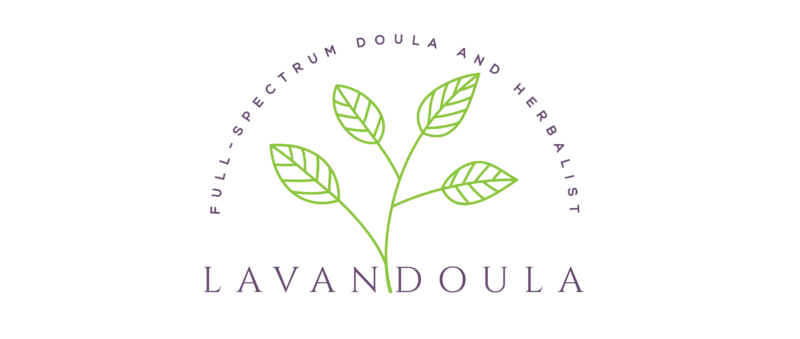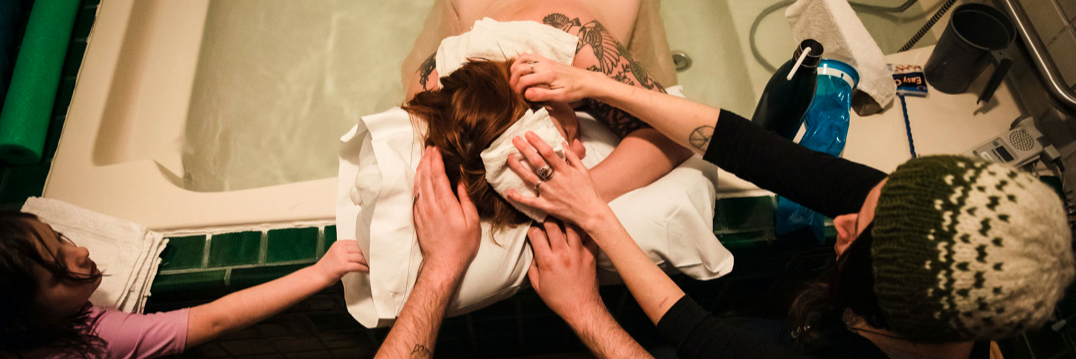Postpartum and Lactation Support
Postpartum Progress and Postpartum Support International promote awareness, prevention and treatment of mental health issues related to childbearing in every country worldwide. They also have a Perinatal Mental Health Alliance for Women of Color
Rachel Hess is an experienced and LGBTQ-friendly postpartum doula who also hosts parenting groups around Jamaica Plain.
Sophie Davis is a dear friend and postpartum doula, serving areas surrounding Newton.
The Every Mother Project provides training & support to birth, postpartum, lactation, and women’s health professionals who work with women and families in the childbearing year in order to reduce barriers that women with perinatal emotional complications face when accessing care.
Jewish Family and Children’s Services Center for Early Relationship Support provides a multitude of free support for young families in the Boston area. You do not have to be Jewish to utilize their services. They have support groups, therapy, and experienced moms who visit new ones to help you get the hang of feeding and caring for your little ones.
One of my doula mentors, Maria Dolorico, started A Mom is Born as a doula business, and has branched out into life coaching, lactation consulting, and holding groups for new parents in downtown Boston. She also offers a free online support course for families on how to plan for the postpartum period.
Zip Milk is a search engine for lactation consultants (LCs) in your area by zip code.
LC Home Visits contains a list of Boston-area international board certified lactation consultants (IBCLCs). In Massachusetts, it is required for insurance to cover lactation support.
BFAR is a resource for folks who want to breastfeed but have had breast/chest or nipple surgery in the past. Whether someone has had a diagnostic surgery, implants or a reduction, this website contains information about increasing the best chances for a healthy milk supply.
Milk Junkies is the website of trans dad, Trevor MacDonald. Once famous for being barred from La Leche League meetings, he now leads them locally in Canada and continues to blog about queer parenthood.
A mini study (22 participants) on transmasculine folks, chestfeeding and gender identity.
Boston-area breastfeeding support groups:
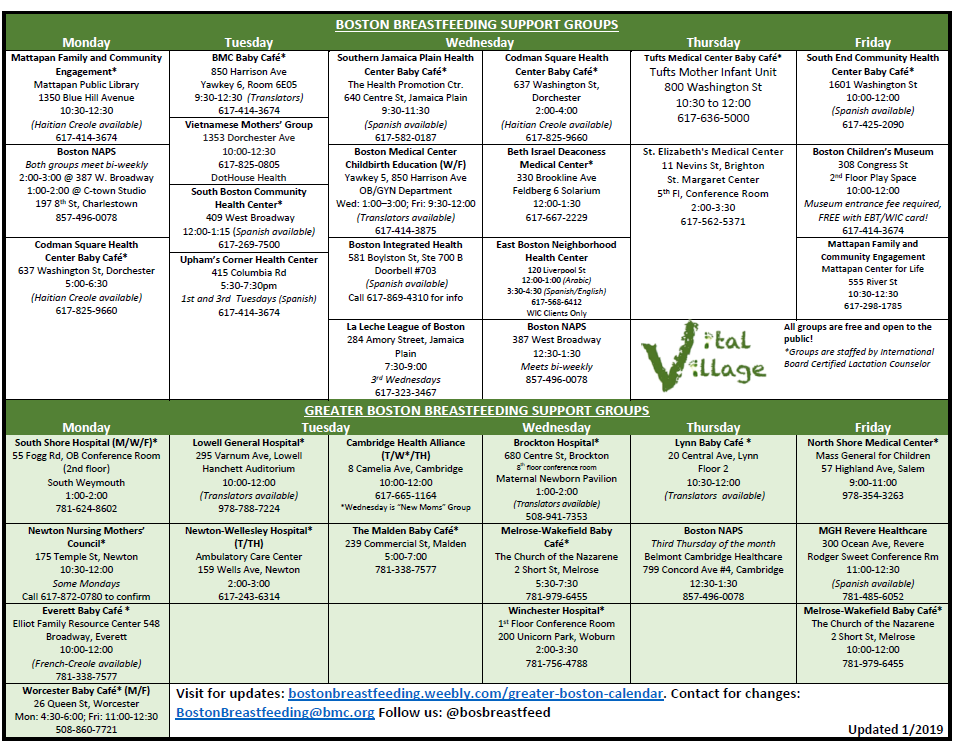
Interview with an Acupuncturist
Last week, I had the pleasure of making a little video interview with local acupuncturist, Angela Bell. She often works with folks who are trying to conceive (including with IVF and other fertility treatments), as well as during pregnancy and generally focuses her practice on women’s health. More about her practice can be found on her Facebook and website.
One thing I so adore about Angela is her desire to connect and highlight others who are birth workers in the Boston area. She holds networking events, and has continued to host a video series on her social media pages for other birth workers to highlight their work. She’s chatted with doulas, massage therapists, midwives, yoga instructors, lactation consultants and others about the work we all do with clients.
In our 30 minute interview, we cover what it means to be a “full-spectrum” doula. I talk about why I decided to become a doula, the work I do with the Boston Doula Project, how others doing this work can best support LGBTQ+ families. We also chat about placenta encapsulation, my practice in Western herbal medicine and what it means to be an advocate for folks in all of this work. If you’re interested to get to know me a little better, check out this video interview!
Herbs for a postpartum birthparent!
I frequently make up batches of nourishing galactagogue herbal tea blends for postpartum clients. Galactagogue is a kooky herbalist term for plants that encourage the production of breast milk. My most recent batch was this:
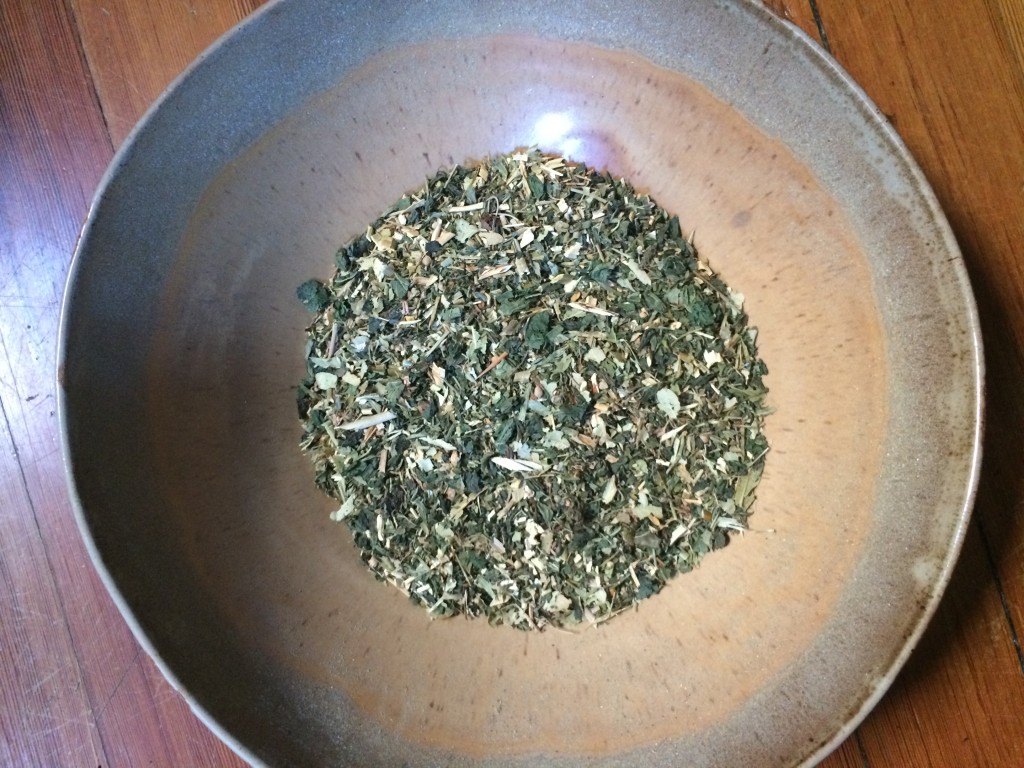
It contains goat’s rue, nettle, linden (leaf and flower), marshmallow (root), moringa and fenugreek. Should be steeped overnight (or however long you can manage, because really, whatever you manage to do postpartum is appropriate!). Maximum mineral extraction happens the longer the tea is steeped, and the cooled water allows the mucilaginous components of both the linden and marshmallow to come through. These are extra moistening, and extra soothing to frayed nerves of under-slept new parents. Many folks rely on herbs to support nursing, and this blend is much stronger and more effective than its grocery store counterpart. I had a client exclusively breastfeeding her twin boys with the help of a blend like this!
I also made this new mom an herbal postpartum sitz bath:
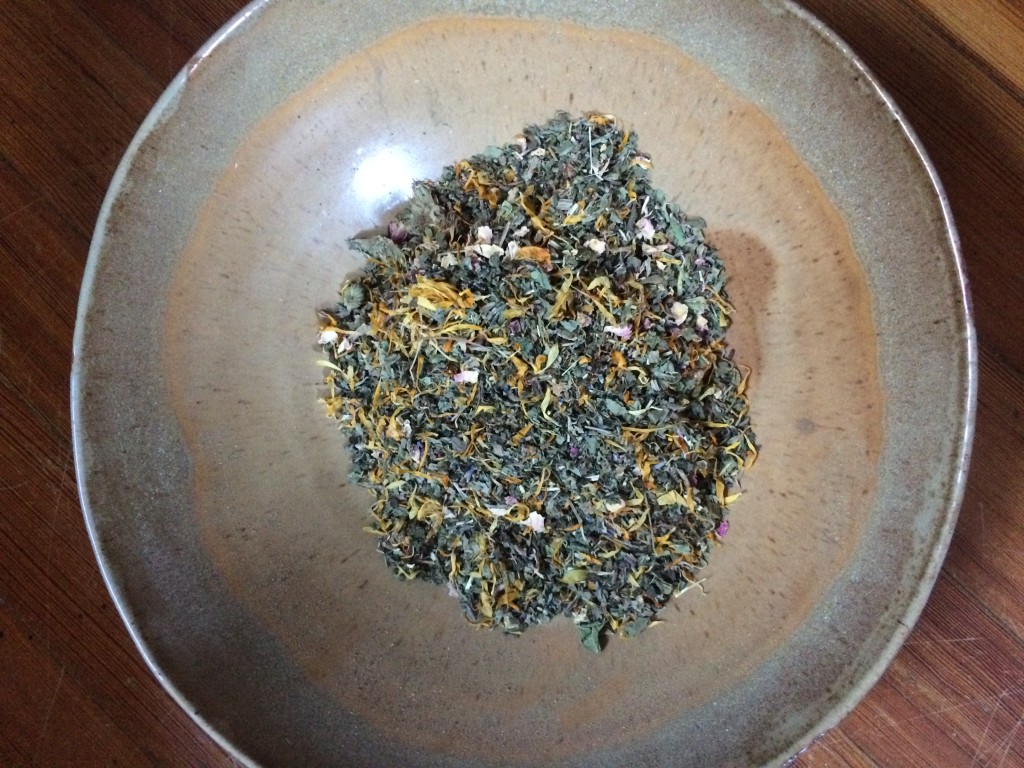
This recipe includes plantain and comfrey leaves, calendula blossoms, rose petals, lavender flowers and yarrow. I love making these baths because the calendula, rose and lavender give it such beautiful color. Plantain contains the tissue proliferant allantoin, which gently encourages skin to heal (especially nice if stitches were needed). Other herbs encourage healing (yarrow), are antimicrobial (lavender), and gently astringent to tighten and tonify tissue back to its comfortable state. These herbs can be steeped for 20 minutes, like a tea, strained well, and added to a sitz bath or used in a peri-rinse bottle.
My ceramic herb mixing bowl is a product of Liz Kinder pottery. I used to sell her pots when I worked at Wild Indigo Boutique in Boston’s South End.
A Full-Spectrum Fertility Chart
A few weekends ago, I had the opportunity to teach first year apprentices at the CommonWealth Center for Holistic Herbalism while the school’s co-directors, Katja and Ryn, were out in Colorado at the American Herbalist’s Guild Symposium.
It was a really fun weekend. Kim from Blue Vervain Farm facilitated children’s health, my beloved roommate Gavin taught about men’s health from a refreshingly queer perspective, Danielle at Growing Habits helped with our cold and flu season materia medica and I was able to teach about women’s reproductive health from my full-spectrum doula perspective.
I began with giving some background on the fertility cycle. We are born with 4 million follicles. By the time we reach puberty, we have about 40,000, ready to mature one (or two)-at-a-time to be ovulated. Progesterone warms us, many hormones constantly in flux. Nobody’s cycle is quite as picture-perfect as the one I had fun drawing as a teaching tool.
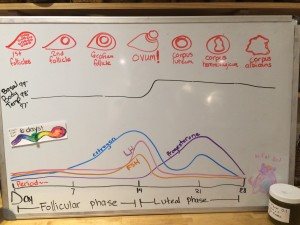
I am grateful for the opportunity to speak about fertility, pregnancy prevention, birth control options, miscarriage, abortion, abortion options, pregnancy in the first, second and third trimester, labor, birth, breastfeeding and postpartum considerations all in one day. (Not to mention the herbs! It is an herb school, afterall…)
It is true that while nearly one third of pregnancies end in miscarriage, it is one of the most silenced fertility experiences. It is true that while one third of women in the US will have an abortion before age 45, cultural stigma hides that “normalcy” from the mainstream. It is true that while the majority people who choose to have an abortion are already parents, our cultural dialogue around fertility states that abortion and birth are two opposites, never to be touched upon in the same sentence, never to be considered within the same lifetime.
As a doula, I have supported women who struggled to conceive for years, after having miscarriages medically managed by D&C procedures. I have supported survivors of violence, who had to terminate pregnancies that resulted from brutal attacks on their bodies. I have supported substance users choosing abortion, queer families choosing gestational parenthood, and single moms bereaving their babies, born still. My practice is full-spectrum.
Herbs for Pregnancy and Birth Workers
Herbs for Pregnancy and Birthworkers
Wednesday, September 16 2015, 7-9pm. $20 (or a donation to the Boston Doula Project)
At the CommonWealth Center for Holistic Herbalism in Brookline, MA
Are you pregnant, or hoping to be, and wondering how to safely and effectively use herbal remedies? Do you work around pregnancy and wish you knew what types of alternatives are good to suggest? Many folks approach midwives, lactation consultants, and doulas for insight on pregnancy and postpartum support herbs. This class, taught by a professional birth doula and herbalist, will help clarify some myths about herbs in pregnancy. (Wait–did Baby Center really just say nettle could cause a miscarriage?) We’ll cover the basics from nourishing uterine tonics and postpartum sitz baths to self-care herbs for birthworkers.
To register, check out the CommonWealth Center website.
As I prepare for my class for Pregnancy and Birth Workers tonight at the CommonWealth Center for Holistic Herbalism, I am looking at my list of materia medica. Some herbs I hope to go over tonight have been previously mentioned in this post. Others, I hope to add to the list as time goes on.
Calendula (Calendula officinalis) – this soothing, lymphatic support herb is great when added to a postpartum sitz bath. I love to use calendula oil on backed-up lymph (like in my neck/behind my ears when I’m getting a cold), or to sooth my belly when I’m feeling bloated.
Goat’s Rue (Galega officinalis) – has been used to support milk production since dairy farmers noticed their goats increased output from eating this common meadow weed. A great breastfeeding herb, and contains chromium, which is a trace mineral helpful for glucose metabolism and curbing sugar cravings!
Marshmallow (Althea officinalis) – a moistening and soothing plant. Cold brew of the root is how you get the most mucilage (nourishing long-chain polysaccharides). I always add a pinch to long-steep lactation tea.
Moringa (Moringa oleifera) – a plant not-at-all native to New England, but often used by nursing mothers in the product “GoLacta”. My opinion is that almost any herb taken in a tea form will be more effective (as many have milk supply issues from simply being dehydrated). Morninga is much cheaper in loose-leaf tea than in the marketed capsules, also.
Milk Thistle (Silybum marianum) – a gentle, trustworthy liver-support herb. Often seen in “mother’s milk” tea blends, but the best way to take the herb is in capsules of the ground up seed. Historically used for nursing support, my theory is this plant supports lactation by helping the liver process the hormonal dump of postpartum reality (cortisol, anyone?)
Plantain (Plantago officinalis) – an edible local weed. Used to soothe bee stings and rashes, support kidneys and heal guts. I always add a little to my postpartum sitz baths.
Materia Medica for Midwives
This was compiled for a class on the use of herbs for pregnancy, labor, postpartum and nursing for a group of professionals on the North Shore in June 2014.
Burdock (Articum lappa)– bitter, Encapsulation: cooling, liver support. Helpful for dry, itchy skin and eczema (though you must identify underlying issue) Safe for use in pregnancy. Eat as food or drink as tea. Prebiotic, contains inulin fibers that feed “good” gut bacteria.
Catnip (Nepeta cataria) – gentle, realaxing herb to calm anxiety, cool heartburn, rest those with insomnia and also useful in quelling nausea. Do not use if ragweed/daisy family allergy.
Chamomile (Matricaria chamomilla) – gentle, anti-nausea, especially when triggered by stress and anxiety. Good for cheap jerseys from China calm tea before bedtime. Stronger infusions make stronger Life antispasmodic properties for muscle cramping. Avoid in case of ragweed/daisy family allergy.
Crampbark (Viburnum opulus)– Antispasmodic for smooth muscle, such as the uterus. Can be used to alleviate menstrual cramps or potentially avoid threatened miscarriage in early pregnancy. High tannin content astringes and slows heavy bleeding.
Dandelion (Taraxacum off.) – mineral-rich, diuretic, useful for UTIs. Bitter flavor supports digestion (can be drunk as tea or eaten as food). Useful for pregnancy-induced hypertension because it drains edema without stripping body of minerals. Root of plant helps make iron more bioavailable, so great for anemics. Roasted roots taste pleasantly of coffee, but are not nearly as harsh on the system.
Dong Quai (Angelica sinensis)– Well-known uterine tonic. Can strengthen contractions but also its volitale oils can have a relaxing effect on the uterus. cheap nba jerseys (Think tea brewed with the top covered or left open). Not a good choice for wholesale nfl jerseys heavy bleeders, as it could increase bleeding.
Garlic (Allium sativum) – Useful for immune support during cold & flu when other drugs are undesirable. May cause strong taste in breastmilk, so be wary of overdoing it on if you’re nursing (only is a problem if infant doesn’t like taste and wont feed as often). Useful to boost immune before GBS test.
Ginger (Zingiber off.) – warming, stimulates blood flow to the pelvic area to alleviate blockages. Anti-nausea and safe for use during pregnancy. Antispasmodic properties can help alleviate menstrual cramps by relaxing smooth muscle (uterus)
Lady’s Mantle (Alchemilla mollis)– has sedative properties to alleviate cramps (contains salicylic acid). Alleviates excessively heavy flow, because of its high tannin content.
Lavender (Lavandula angustofolia) – drying, calming herb. Good for headaches, herbal baths. Antibacterial, essential oil can be added to massage oils (but not for hospital settings as many are scent-free).
Lemon Balm (Melissa off.) – cooling, relaxing herb that is safe for use during pregnancy. For HSV+, increase chance of vaginal birth by taking lemon balm tea in advance. Topically and internally helps fight viruses that attack the nerves, like herpes and HPV.
Nettle (Urtica dioica) – slightly cooling, drying. Diuretic, helpful for kidney issues, especially hypertension-induced edema. Useful to reduce proteinurea, overtaxed kidneys in pregnancy. Full of calcium, iron, and vitamin K: it’s food! Long cheap nba jerseys steep necessary to extract all minerals from the dried leaf. Absolutely necessary for vegetarians and anemics. Daily nettle replenishes magnesium, which Video relieves menstrual cramps.
Red Raspberry Leaf (Rubus spp.)– tonifying, mineral-rich plant with iron, calcium and magnesium. Long-steep tea. Much loved and recommended throughout pregnancy as SC a “uterine tonic.” Astringent, can stop excessive bleeding and calm intense cramping, lessen chances of postpartum hemorrhage.
Rose (Rosa rugosa)– Fruit of plant (rosehips) contain lots of vitamin C, which is useful in the winter months and have pleasant taste. Petals in tea or infused into massage oil make anyone feel special!
Shepherd’s Purse (Capsella bursa-pastoris)– well-known to stop hemorrhaging, either in childbirth or for heavy menses. Astringent, helpful for uterine prolapse (along with alignment exercises).
Yarrow (Achillea millefolium) – для Bitter, regulates flow of blood. Decreases heavy menstrual bleeding, especially combined with shepherd’s purse. Useful topically for wounds, so it’s great in a postpartum sitz bath. Also useful for fever.
